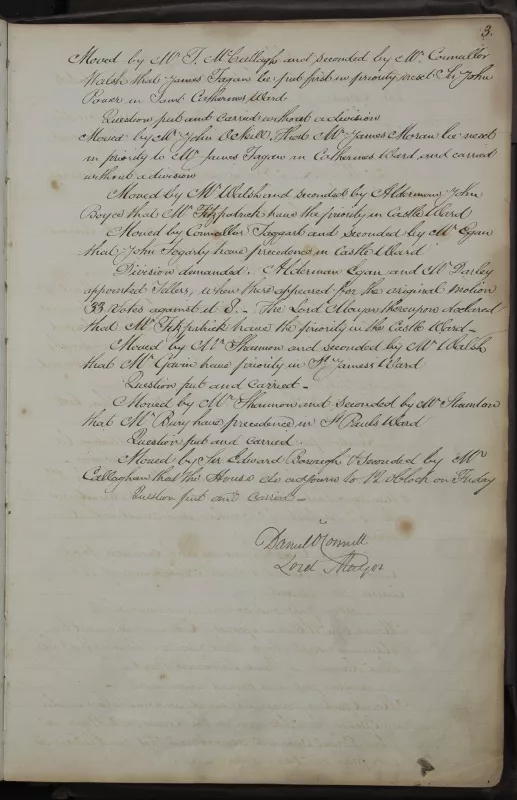181 years later: digitised minutes of Dublin City Council meetings
Published on 24th March 2022
On Monday the 1st of November 1841 the very first meeting of Dublin City Council took place at the City Assembly House in South William Street.
The first item on the agenda was the election of a Lord Mayor. Daniel O’Connell was elected as the first Catholic Lord Mayor in over 150 years.
1841 represented a watershed moment when non-Anglicans could vote. Although the franchise was narrow, confined mainly to ratepayers with a property valuation of ten pounds yearly, this was enough to create an electorate which crossed the sectarian divide.
Their numbers on DCC were very close, and this allowed O’Connell to initiate the ‘Mayoralty Compact’ as a power-sharing exercise, with a unionist Lord Mayor one year, and a nationalist Lord Mayor the next.
Motions passed at the meeting largely concerned the election. But the nuts and bolts of municipal government also arose – after an adjournment a letter was read from John Semple engineer about the cleansing of Blessington Street Basin, ‘consideration reserved for the Pipe-Water committee’.
The minutes of this meeting, and all Dublin City Council meetings for the following 40 years have now been scanned and made available online on the Digital Repository of Ireland (www.dri.ie) for anyone to access, free of charge.

Speaking about the minutes, Dublin City Librarian Mairead Owens remarked: ‘We in Dublin City Libraries are proud custodians of the records of Dublin Corporation going right back to the middle ages. When you see the handwritten minutes of these meetings, with Daniel O’Connell’s very own signature at the bottom of the page, the history of the City comes to life before your eyes. We are delighted to be making these important documents freely available via the DRI, so that inside story of Dublin and its government can be read by people all over the world.
The 40 years of minutes cover the development of Dublin City Council as it gradually took over the functions and property of other organisations, such as the Wide Streets Commission and the Paving Board. These minutes therefore tell the story of the many changes which took place over the period, including the establishment of Dublin Fire Brigade in 1862; the improvement the City’s water supply with the opening of the Vartry Reservoir at Roundwood, in 1868, and the building of social housing from 1875 onwards.
DRI Director Natalie Harrower says ‘we are delighted to include this collection in the repository. It covers a hugely important period in Dublin’s history when decisions were being made by the council that affected the lives of hundreds of thousands of people. This makes it a rich resource that is ripe for investigation by researchers. The minutes can be viewed alongside a wealth of the other thematically similar collections in the repository’.
These 40 years of minutes cover the development of Dublin City Council. As time went on the City Council took over the functions and property of other organisations such as the Wide Streets Commission and the Paving Board. These minutes cover the formation of modern local government for the City we enjoy today. Some of the many changes which took place over the period include:
- Dublin Fire Brigade was set up in 1862 replace the hotchpotch of voluntary firefighters which had served the City Council until then.
- In 1868 the city’s water supply was dramatically increased with the opening of the Vartry Reservoir at Roundwood.
- From 1875 onward, a series of Acts of Parliament gave the Corporation power to build housing for the working classes.
The documents
The DCC held its meetings on the first Monday of each month, notes were taken by the Town Clerk of Dublin and by his assistants, and these were worked up into minutes of meetings which were entered in a fair hand into large bound volumes each one containing up to 520 blank paper pages which were then painstakingly indexed by the clerks.
These are large and heavy volumes, which even though they are easy to read and have been indexed, are rarely consulted by researchers or historians. It is hoped that their digitisation should go some way to addressing this issue.
Who was on the Council?
Some things haven’t changed – then as now we had Councillors Burke, Butler, Byrne, Callaghan and Roe.
Then Now
James Burke Christy Burke,
Luke Butler Dearbháil Butler
Joseph Byrne Clare Byrne
Danny Byrne
Ignatius Callaghan Mary Callaghan
George Roe Patricia Roe
Transcription Week from Dublin City Libraries on Vimeo.
The project
The digitisation of these minutes was funded through the EU CEF funded EnrichEuropeana+ project. The Minutes will be transcribed during the Transcription Week event taking place from the 28th of March to the 1st of April where people from all over Ireland will work together to unlock important historical documents and make them more easily available to historians, researchers, students and members of the public.
More background information on Transcription Week - get in touch.